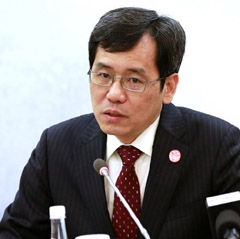Member economies of the Asia-Pacific Economic Cooperation are working on a blueprint that seeks to boost regional interconnectivity and other trade facilitation measures, a top Chinese official who participated in the meetings said on Thursday.
"The blueprint aims at improving infrastructure such as roads, railways and telecommunication to strengthen connections of member economies on a 'physical' level," said Tan Jian, China's Senior Official for APEC.
|
 |
|
Tan Jian, China's senior official for APEC. [Provided to China Daily] |
"The organization will work to adjust regulations to reduce barriers at an institutional level. Among the measures we discussed was the feasibility of a Single Window Customs clearance system among the member nations," Tan said .
He said APEC will also take measures to facilitate personnel mobility within the region, such as simplifying visa application and entry and exit procedures.
"We already have the APEC Business Travel Card, which guarantees visa-free travel for the business community among participating APEC nations," Tan said.
The two-day Senior Officials' Meeting, which concluded in Beijing on Thursday, was part of the preparations for the 2014 APEC Economic Leaders' Meeting, which is slated to be held from Nov 10 to 11 at Yanqi Lake, a resort town 50 km from downtown Beijing, under the theme of "Shaping the Future through Asia-Pacific Partnership".
Zhang Monan, a deputy researcher with the China Center for International Economic Exchanges, said Asian countries have realized that advancing connectivity with regional partners in every aspect is crucial for better economic integration within the region and also to fuel the next phase of growth.
"A large channel, in which commodities, capital, transportation, logistics and information flows freely between China and other APEC nations, will be established," Zhang said.
Xiong Aizong, a researcher with the Institute of World Economics and Politics at the Chinese Academy of Social Sciences, said: "Many countries in the Asia-Pacific region will benefit from the enhanced connectivity. The APEC offers an opportunity for multiple sides to communicate in time."
Last year, at the end of the 21st APEC Economic Leaders' Meeting in Bali, Indonesia, leaders of the Asia-Pacific economies agreed to "shape the strategic landscape of the region through a long-term commitment" that will accelerate physical, institutional, and people-to-people connectivity.
Apart from the discussions on connectivity, Tan said the meetings also yielded important consensus on two other topics for this year's APEC, which are advancing regional economic integration and promoting innovative development, economic reform and growth.
"We are committed to building, expanding and deepening as much consensus as possible before the eventual leaders' meetings in November," Tan said.
"Many member economies have very high expectations on China as a host under the backdrop of uncertain global economic recovery and China's ongoing reforms," he said.
?
